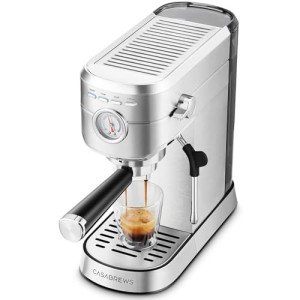Best Espresso Machines: A Comprehensive Guide
Espresso machines have actually ended up being a staple in coffee culture, attracting enthusiasts and casual drinkers alike. The best shot of espresso can elevate the coffee experience, and selecting the best machine is vital for achieving this objective. This post explores the world of espresso machines, exploring a few of the best choices available on the market today. click through the following web site will cover the kinds of machines, key functions to think about, a contrast table, and often asked concerns.
Kinds Of Espresso Machines
Before venturing into particular products, it's important to understand the different kinds of espresso machines available:
- Manual Machines: Also understood as lever machines, these require the user to by hand manage the pressure and flow of water. They use a hands-on experience however demand more skill.
- Semi-Automatic Machines: These machines automate the pressure and temperature level, while allowing users to control the shot timing. They are perfect for those who desire to take control without requiring too much effort.
- Automatic Machines: These devices automate the developing procedure completely; users simply pick the size and strength of the shot. Great for newbies.
- Super-Automatic Machines: This type grinds the beans, tamps, brews, and even froths milk automatically. They're excellent for convenience, making them ideal for those who want speed without sacrificing quality.
- Capsule Machines: Utilizing pre-packaged coffee pods, these are the simplest machines for making espresso. While convenient, they frequently lack the depth of flavor found in freshly ground beans.
Key Features to Consider
When looking for the best espresso machine, a number of crucial functions ought to guide your decision:
- Pressure: The ideal pressure for an espresso machine is 9 bars. This pressure is essential for drawing out flavors effectively.
- Temperature Control: Consistent water temperature is crucial for a great espresso. Look for machines with PID (Proportional Integral Derivative) temperature control.
- Construct Quality: Machines made from high-quality products tend to last longer and provide a better experience.
- Size and Footprint: Consider your available counter space. Some machines are compact, while others need significant space.
- Grinder Quality: A built-in grinder offers benefit, but the quality of the grinder affects the last taste. Heat Exchange Espresso Machines or doserless types alter the taste profile significantly.
- Relieve of Use and Cleaning: Consider how simple the machine is to clean and keep. Black Espresso Machines with detachable parts generally use simpler cleaning.
Comparison Table of Best Espresso Machines
Here's a contrast table showcasing a few of the most suggested espresso machines based upon numerous user reviews and professional rankings:
| Espresso Machine | Type | Pressure (Bars) | PID Control | Grinder Type | Cost Range |
|---|---|---|---|---|---|
| Breville Barista Express | Semi-Automatic | 9 | Yes | Conical burr grinder | ₤ 600 - ₤ 700 |
| De'Longhi EC155 | Manual | 15 | No | No grinder | ₤ 100 - ₤ 150 |
| Rancilio Silvia | Semi-Automatic | 9 | No | No grinder | ₤ 700 - ₤ 800 |
| Saeco Xelsis | Super-Automatic | 15 | Yes | Integrated grinder | ₤ 1,000 - ₤ 1,500 |
| Nespresso VertuoPlus | Capsule | N/A | No | No grinder | ₤ 150 - ₤ 200 |
| Gaggia Classic Pro | Semi-Automatic | 9 | Yes | No grinder | ₤ 400 - ₤ 500 |
Summary of Best Espresso Machines
- For Beginners: The De'Longhi EC155 is an excellent beginning point due to its affordable price and ease of use.
- For Serious Enthusiasts: The Rancilio Silvia provides a balance between quality and control, attracting those who wish to refine their barista abilities.
- For Convenience: The Saeco Xelsis stands out as a top super-automatic alternative, best for users looking for maximum ease without compromising taste.
Frequently Asked Questions (FAQs)
Q1: What is the very best pressure for extracting espresso?A1: The ideal pressure is 9 bars; this pressure level is optimal for drawing out the tastes in espresso.
Q2: How frequently should I clean my espresso machine?A2: Regular cleansing is important. For machines with built-in mills, it is best to clean them after every use. Deep cleansing ought to be done weekly or monthly depending on usage and model.
Q3: Can I use regular coffee in an espresso machine?A3: Espresso is made from finely ground coffee, preferably roasted specifically for espresso. While you can use regular coffee, the taste and extraction may differ.
Q4: How long can my espresso machine last?A4: With proper care and maintenance, a high-quality espresso machine can last a number of years, even years.
Q5: What grinder should I use for espresso?A5: A burr grinder is preferable, as it supplies consistent grind size which is vital for appropriate extraction.
The journey to finding the very best espresso machine can be an amazing one, filled with discovery and potential for establishing one's coffee palate. Whether selecting the simpleness of a capsule machine or the control of a manual design, understanding the different types and functions can significantly enhance the experience. With advances in innovation and development, there's an ideal espresso machine for all preferences and skill levels on the marketplace today. Buying the best machine not only promises terrific taste however likewise elevates the total coffee experience.

